The Mastercard Foundation prioritizes elevating the voices of all youth, including the voices of young people with disabilities.
Recently, the Foundation hosted a roundtable aimed at elevating the voices of young people with disabilities—all of whom are working to drive innovative change in their communities.
In Africa, people with disabilities make up over 80 million of the continent’s population. They’re twice as likely to be unemployed than their counterparts without disabilities. Additionally, the unemployment rate and barriers to dignified and fulfilling work are even higher for women with disabilities.
What needs to change so that disability inclusion is seen as a prime concern for governments, educators, and employers in Africa?
We asked the experts — young people with disabilities who know from firsthand experience—about the strategies and programs that work to make disability inclusion a real practice that brings about the kind of accessibility that changes lives.
The theme of the roundtable was Voices Amplified: Youth with Disabilities Leading Innovative Change, and there was no shortage of ideas on how to create stronger education systems, economies, and communities in which everyone has a place and can meaningfully contribute.
Youth Changemakers Leading the Conversation on Disability Inclusion
What does it take to create inclusion in education and work?
Hear from youth leading innovative change in their communities and beyond. Watch this inspiring roundtable discussion on the challenges and opportunities faced by African youth with disabilities.
What needs to change?
From an early age, young people with disabilities face systemic inequalities in accessing education and the crucial support interventions needed in their first years of schooling.
Sixty-one percent of young people with disabilities in Africa aren’t enrolled in school. They are also far behind other job seekers in terms of seeking employment opportunities. Their setbacks often continue to compound, and the inequality gap grows.
Even when changes are made to increase accessibility in schools and office spaces, they are often implemented in a one-size-fits-all manner, which doesn’t take into account the diverse needs of individuals.
The starting point for effective disability inclusion strategies is by facilitating conversations led by people with disabilities. They have the lived experience to create authentic, innovative solutions to systemic inclusion barriers – barriers such as accessibility, communication, policies, and stigma. And they know what it will take to increase access to education and dignified and fulfilling work opportunities. Programs to support their needs must be developed with their input, collaboration, and leadership.
“The individual using [disability tools and accommodations] knows what works best for them,” says Enitan Sophie Oluwa, Founder of Natineee Empowerment for Sustainable Impact Initiative, which advocates for disability and gender rights in Lagos, Nigeria.
Enitan and the other panelists that participated in the roundtable shared that they want more than just a seat at the table—they want to speak up and be heard on the issues that impact their lives, and even those that may not be accounted for with a disability lens, such as mental health.
“I think that mental health is really, really important, and we need to speak more about it,” says Faith Musayoki, a Mastercard Foundation Scholar and student at the United States International University Africa. “We need to be more conscious of it and aware of how the complexity of having a disability, the complexity of being a woman, all of these things couple up. It becomes very complex for people with disabilities. Mental health is very important. With the little information that you have, you can make a difference. You should speak up.”
Change is coming
“We change mindsets,” says Nina Efedi Okoroafor, the Youth Chairperson on the African Union of the Blind board. Nina is also a disability rehabilitation social worker and an advocate for people with disabilities. She believes change will come through the work that people like her and the others on the panel are doing through advocacy.
“We owe it to ourselves and people like us to advocate for them and to help teach our people. Be mentors to people who have disabilities and help them understand all the different things they can do with their lives, not to despair, and to get up and chase whatever dream they have. Not to listen to what people say—that you can’t do it, that you are not going to amount to anything.”
For Faith, advocacy means doing away with the “them” and “us” narrative that exists between people with disabilities and those without. Advocacy is the job of entire communities.
“Disability is viewed as this standalone issue that is left for organizations to manage. Disability is not viewed as an us problem, and I think we need to really emphasize the fact that disability is a communal thing,” she explains. “We as communities need to take ownership of disability and understand that it’s an us thing. Advocacy really is more than that, and the biggest percentage of advocacy isn’t even what we think it is. It’s not just organizations doing advocacy. Advocacy goes way back into the community.”
Looking ahead
The Mastercard Foundation is working with partners across Africa to remove barriers to education and employment for young people with disabilities to support their dreams and aspirations. We’re shaping this work based on consultations with young people with disabilities.
Some of the input, suggestions, and calls to action we received from the panelists at the roundtable include:
- Facilitate improved teacher training to help teachers interact with children with disabilities, identify those disabilities, and escalate treatment and accommodations for children with disabilities.
- Improve access and affordability to tools and systems to support the unique needs of individuals with disabilities—including assistive and digital technologies.
- Implement solutions and accommodations pre-emptively instead of on an ad hoc basis, which is more expensive and creates delays.
- Find pathways to include parents, teachers, friends, and entire communities in disability inclusion advocacy.
- Create communication bridges between parents and teachers so that they can better support children with disabilities, reduce stigma, and find interventions earlier.
- Do away with the idea that people with disabilities simply want a job and focus on dismantling systemic barriers to dignified and fulfilling work.
- Do not make assumptions about the potential that people with disabilities have. Recognize their unique talents and perspectives, their adaptability, and their innovative problem-solving skills – all of which are an asset to employers and their communities.
- Reflect on the misconceptions you hold about disability and work with others to tackle harmful stigmas and change mindsets. Changing mindsets is a powerful way to create change and is within everyone’s reach to implement.
“If you can reach back and touch a life and change a mindset to shift perceptions, then I think we will be bringing up an empowered generation of children with disabilities,” says panel moderator Julius Mbura, an Advocacy Officer Head of Legal and Computer Assistive Technology at inABLE. “To get to that point where they say, ‘I am liberated. I’m free. Where I am today is not the same place I’ll be tomorrow, next year, or in five years to come.’”
The We Can Work program in partnership with Light for the World is centering disability inclusion within the Mastercard Foundation’s broader Young Africa Works strategy, which aims to enable 30 million young people to access dignified and fulfilling work by 20230. It will enable the Foundation’s programs and partnerships to become more disability inclusive, led by the expertise of young people with disabilities in the role of Disability Inclusion Facilitators.
Panelists
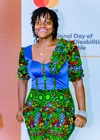
Nina Efedi Okoroafor, Ghana
Founder of a disability support services startup
Nina Efedi Okoroafor is the assistant social development officer at the Department of Social Welfare, and she works in the fields of counselling, disability rehabilitation, and planning at the Accra Rehabilitation Center. As a person with a visual impairment, Nina invests much of her energy in this area of disability advocacy. She’s the founder of a disability support services company in Ghana that offers assistance to persons with disabilities and businesses seeking to make their policies, products, and services accessible to the disability community. She’s also the youth chairperson on the board of the African Union of the Blind and is the president of the Greater-Accra Blind Sports Association.
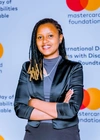
Divine Uwiragiye, Rwanda
A Mastercard Foundation Youth Advisory Group member
As a member of the Mastercard Foundation’s Youth Advisory Group, Divine advocates for young people with disabilities to access education opportunities and meaningful work. A graduate of Davis College in Rwanda, Divine majored in business management and entrepreneurship. After that she transitioned to work as a field officer with Uwezo, another advocacy group assisting young children with disabilities. When she’s not engaged in supporting her community through activism, Divine spends her time creating content for TikTok aimed at helping people live in the moment and embrace their downtime through healing, rest, and relaxation.
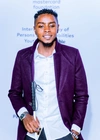
Julius Mbura, Kenya
Advocate for the visually impaired
A graduate of the University of Nairobi, Julius Mbura works in the field of advocacy for disability rights and inclusion at inABLE. He is the program manager for the AdvocABLE project supporting blind and visually impaired students with advocacy, mentorship, and the creation of community. Julius, a visually impaired person who has lost his sight twice in his lifetime, says that his life’s mission is to promote disability inclusion and shift perceptions on disability. “I strive to impact as many souls as possible through my work,” he says. Julius is a public speaker who has appeared on BBC Africa, KTN News, and Switch TV. He was a featured speaker for the last three years at the Inclusive Africa Conference promoting digital accessibility advancements in Africa.
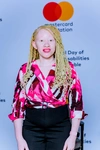
Faith Musayoki, Kenya
Mastercard Foundation Scholar and budding content creator
Faith Musyoki is a software engineering major at USIU Africa and a Mastercard Foundation Scholar. She’s a business intelligence intern at Safaricom PLC and she’s also a mom to a six-year-old boy. A wearer of many hats, Faith is a budding content creator who advocates for disability inclusion and shares what it’s like to live with albinism. “I speak about my personal experiences [and] everyday struggles that involve what it’s like to be in my skin.” In her disability advocacy, Faith believes that it’s important to take up spaces that aren’t traditionally inhabited by those with disabilities.
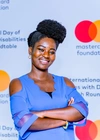
Antwi Gladys, Ghana
Former teacher for the visually impaired
With a bachelor’s degree in special education focusing on visual impairment, Antwi worked with visually impaired students for 18 months in the eastern region of Ghana. After teaching in a school for the blind in 2019, Antwi found a position at the standard secondary school where she’s currently employed. In her free time she likes to listen to music, cook, and read.
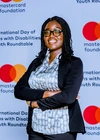
Enitan Sophie Oluwa, Nigeria
Advocating for inclusive reproductive health
Enitan Sophie Oluwa is the founder of the Natineee Empowerment for Sustainable Impact Initiative in Lagos, Nigeria. It’s a youth-led organization dedicated to inclusive advocacy that facilitates the empowerment of women and persons with disabilities. Enitan’s advocacy work centres on disability and gender rights as well as sexual and reproductive health. Through digital media, her organization brings comprehensive sex education to groups of young people (especially those with disabilities) so that they can make informed decisions about their reproductive health.




